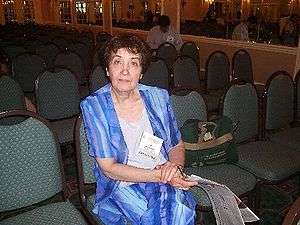Irina Beletskaya
Irina Petrovna Beletskaya (Russian: Ири́на Петро́вна Беле́цкая) (born 1933) is a professor of chemistry at Moscow State University. She specialises in organometallic chemistry and its application to problems in organic chemistry. She is best known for her studies on aromatic reaction mechanisms, as well as work on carbanion acidity and reactivity.[1] She developed some of the first methods for carbon-carbon bond formation using palladium or nickel catalysts, and extended these reactions to work in aqueous media. She also helped to open up the chemistry of organolanthanides.
Irina Beletskaya | |
|---|---|
 Irina Beletskaya in 2005 | |
| Born | March 10, 1933 |
| Citizenship | Russian |
| Alma mater | Moscow State University |
| Known for | Studies on aromatic reaction mechanisms, palladium and nickel catalysed methods for C-C bond formation |
| Awards | Lomonosov Prize (1974)
Demidov Prize (2003) IUPAC 2013 Distinguished Women in Chemistry or Chemical Engineering Award (2013) |
| Scientific career | |
| Fields | Organometallic chemistry |
| Institutions | Moscow State University |
Academic career
Beletskaya was born in Leningrad (St. Petersburg, Russia) in 1933.[1] She graduated from the Department of Chemistry of Lomonosov Moscow State University in 1955. She obtained the Candidate of Chemistry (analogous to Ph.D) degree in 1958.[2] In 1963 she received her Dr.Sci. degree from the same institution.[3] In 1970 she became a Full Professor of chemistry at Moscow State University,[4] where she currently serves as head of the Organoelement Chemistry Laboratory. Beletskaya was elected a corresponding member of the Academy of Science of USSR in 1974. In 1992 she became a full member (academician) of the Russian Academy of Sciences.[1] Between 1991-93 she served as president of the Division of Organic Chemistry of IUPAC.[1] Until 2001 she served on the IUPAC Committee on Chemical Weapons Destruction Technology (CWDT).[5] She is editor-in chief of the Russian Journal of Organic Chemistry.[6]
Beletskaya initially researched on the reaction mechanisms. She, together with Prof. O. Reutov worked on electrophilic reactions at saturated carbon. She also investigated the reaction mechanisms of organometallic compounds. She also researched carbanion reactivity, with emphasis on reactivity and structure of ion pairs.[2]
Honors and awards[7]
- Lomonosov Prize, 1974.
- Mendeleev Prize, 1979.
- Nesmeyanov Prize, 1991.
- Demidov Prize, 2003.
- State Prize, 2004.
- IUPAC 2013 Distinguished Women in Chemistry or Chemical Engineering Award, 2013.
References
- "A Tribute to Prof. Irina P. Beletskaya" (PDF). Arkivoc. 2008 (iv): 1–7. Jun 10, 2007.
- "A Tribute to Prof. Irina P. Beletskaya". Arkivoc. 2008 (4): 1. 2007-06-10. doi:10.3998/ark.5550190.0009.401.
- "Division of Organic Chemistry". Moscow State University. April 14, 2006. Retrieved 2007-09-10.
- Beletskaya, Irina; Tyurin, Vladimir S.; Tsivadze, Aslan Yu.; Guilard, Roger; Stern, Christine (2009-05-13). "Supramolecular Chemistry of Metalloporphyrins". Chemical Reviews. 109 (5): 1659–1713. doi:10.1021/cr800247a. ISSN 0009-2665. PMID 19301872.
- Hargittai, Magdolna (2015-03-04). Women Scientists: Reflections, Challenges, and Breaking Boundaries. Oxford University Press. ISBN 9780199359998.
- "Russian Journal of Organic Chemistry (Editorial Board)". springer.com. Retrieved 2016-04-19.
- "Biographies". New Trends in Cross-Coupling. Catalysis Series. 2014. pp. P021–P036. doi:10.1039/9781782620259-fp021. ISBN 978-1-84973-896-5.